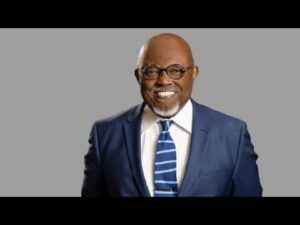The last of the nation’s biggest banks reported their second-quarter earnings this morning. Goldman Sachs beat expectations, as the firm’s traders were able to capitalize on volatile markets. Bank of America’s bottom line was in line with expectations, but its earnings still fell by a third from the same quarter a year ago.
Mr. Jassy goes to Washington (a lot)
When Jeff Bezos led Amazon, he kept his distance from Washington. He rarely lobbied lawmakers and testified before Congress only once, under threat of subpoena. Andy Jassy, though, has visited Washington at least three times in the year since he took over the top job from Amazon’s founder. It’s just one of the ways Jassy is changing how the retailing giant and technology juggernaut operates, report The Times’s David McCabe and Karen Weise in a profile of the Amazon C.E.O. out this morning.
Jassy is quickly putting his imprint on the company. The longtime Bezos lieutenant has made more changes than many expected.
-
He’s delved deep into logistics and other parts of the business that his predecessor left to deputies.
-
He’s cut costs, admitted Amazon overbuilt, and overseen tumultuous leadership changes.
-
He’s struck a conciliatory tone with employees while maintaining Amazon’s long-held and often aggressive opposition to unions.
The biggest difference between Jassy and Bezos may be their engagement with Washington. Jassy has called Senator Chuck Schumer, the Democratic majority leader, on antitrust reforms. He’s talked with Senator Tim Kaine, Democrat of Virginia, about Amazon’s new corporate campus in the state. He’s also met twice with Virginia’s other Democratic senator, Mark Warner, a co-sponsor of a bill that would limit Amazon’s ability to prioritize its own products over others’ on its website. “He’s very inquisitive,” said Kaine, who met with Jassy in Washington in September.
A more direct approach in Washington may be borne of necessity. Amazon is facing regulatory scrutiny on several fronts.
-
Antitrust: In addition to the bill that would limit how Amazon can feature products in its marketplace, the F.T.C. chair, Lina Khan, is investigating whether Amazon’s market dominance is limiting rivals’ ability to compete.
-
Unions: Last year, Biden threw his support behind Amazon workers who were trying to unionize and hosted a union organizer in the Oval Office.
-
Amazon has responded by expanding its lobbying. It spent $19.3 million on federal lobbying in 2021, up from $2.2 million a decade earlier, according to OpenSecrets, which tracks influence in Washington.
And Jassy’s more direct approach appears to be paying off. “Not many lobbyists would be able to sit down with — or even get a call with — most of the members of congressional leadership at all,” said Daniel Auble, a senior researcher at OpenSecrets. “But of course the C.E.O. of Amazon can get them all on the phone.”
HERE’S WHAT’S HAPPENING
Central banks intensify efforts to curb inflation. At least 75 central banks have raised interest rates, many from historically low levels, and the European Central Bank is expected to make its first rate increase since 2011 at a meeting this week. Officials have signaled that a rise of only a quarter percentage point is likely, probably followed by a larger move in September.
A report on the Uvalde shooting finds “systemic failures” in the police response. The decision to finally confront the gunman was made by a small group of officers and could have come much earlier, the report said. The findings were the most complete outside account of what took place during the 77 minutes between when a gunman began firing inside the classrooms of a Texas school, eventually killing 21 people, and when the police stormed in.
Britain braces for perhaps its hottest day. Temperatures in some areas there may top 100 degrees Fahrenheit, a rarity that has prompted a national emergency. Spain, Italy and France were also preparing for scorching temperatures, with wildfires in the South of France expected to sweep into the north. Italy was experiencing its worst drought in years.
8 Signs That the Economy Is Losing Steam
Worrying outlook. Amid persistently high inflation, rising consumer prices and declining spending, the American economy is showing clear signs of slowing down, fueling concerns about a potential recession. Here are other eight measures signaling trouble ahead:
Climate stalls as a political issue in the U.S. Senator Joe Manchin’s rejection of a compromise climate bill tells a familiar story: Voters and politicians put a higher premium on immediate issues, such as inflation and the economy. Just 1 percent of voters in a recent New York Times/Siena College poll named climate change as the most important issue facing the country.
A matter of timing
Elon Musk’s lawyers formally responded on Friday to Twitter’s request to fast track its lawsuit demanding that he complete his $44 billion acquisition. The social media company has requested a four-day trial in September, arguing that the longer the dispute goes on, the more it harms the company and its shareholders. Musk is proposing February, so he has time to dive into how Twitter counts bots.
The judge overseeing the case, Kathaleen McCormick, will hold a hearing tomorrow to decide how quickly to proceed. Her decision is a preview of the most important issue of the case: What, exactly, would Musk be entitled to prove at a trial?
Musk wants to drill into Twitter’s bot count. That was the focus of his court filing on Friday, and his main reason, according to the filing, to seek a prolonged process in which he would call in third-party experts, consultants and Twitter executives. “The core dispute over false and spam accounts is fundamental to Twitter’s value,” Musk’s lawyers write. “It is also extremely fact and expert intensive, requiring substantial time for discovery.”
Twitter wants to keep the focus on the merger agreement. The contract Musk signed does not give him a simple out if Twitter has more bots than he thought. Twitter may contend that the actual bot number is irrelevant: It had already told investors (and Musk) in filings that the numbers it gave for spam and fake accounts on its platform were estimates. Twitter also warns that third parties may struggle to calculate the figures, so it may try to push back against the value of any outside testimony.
This decision will reveal a lot about the case. Judge McCormick will be indicating just how relevant she considers Twitter’s bot count to be — and how deep in the drudgery of bot counting she is willing to go. She most likely knows that if she draws out the process, as Musk’s team has requested, a wide watching public may take it as a sign that she sees something in his claims. But she may also want to ensure she appears thorough and scrupulous.
Judge McCormick has been here before. In a case over the private equity firm Kohlberg’s attempt to walk away from its acquisition of the cake decoration maker DecoPac during the height of the pandemic, she did not grant an expedited trial. But DecoPac was a private company, not subject to the whipsaw of daily trading, the pressures of public shareholders or the drama generated by Musk. And she did ultimately force Kohlberg to complete the deal.
“The five biggest semiconductor companies that will likely receive the lion’s share of this taxpayer handout — Intel, Texas Instruments, Micron Technology, Global Foundries and Samsung — made $70 billion in profits last year. Does it sound like these companies really need corporate welfare?”
— Senator Bernie Sanders of Vermont on why he opposes a measure that would provide more than $52 billion for companies that build semiconductor factories in the U.S.
The dollar hits a 20-year high
The dollar is up 10 percent this year and is now at a 20-year high. Often called the world’s reserve currency, it typically climbs during times of global turmoil. But U.S. inflation, rising interest rates and worries over growth coming out of the pandemic have sent it soaring.
That’s good news for Americans traveling abroad. But a soaring dollar can have a destabilizing effect on the global economy — disrupting the demand for imports and exports, influencing the profits of multinational corporations and raising borrowing costs for poorer countries that tend to borrow in dollars, report The Times’s Karl Russell, Joe Rennison and Jason Karaian.
Companies outside the U.S. have seen their sales rise. Burberry, the British luxury goods maker, said on Friday that it would add more than $200 million to its revenue this year because of currency movements — helping to offset a decline in sales in China, where the economy is slowing.
Understand Inflation and How It Impacts You
But it’s more bad news for American companies and U.S. investors. Ben Laidler, a global markets strategist at eToro, estimates that the rise in the dollar will shave 5 percent off the earnings growth of S&P 500 companies this year, or roughly $100 billion. Reflecting the drag, companies that generate most of their revenue in the U.S. have performed better than rivals with more foreign sales.
The financial stability of poorer nations could be at risk. Paying interest to creditors in dollars has become particularly difficult for countries with rapidly depreciating currencies, such as Argentina and Turkey, especially as interest rates on any new debt will also go up. In some cases, like in Sri Lanka, it has become seemingly impossible.
Can the buck be stopped? The U.S. economy is looking shakier, but as Europe faces an energy crisis, Japan resists raising interest rates, China’s Covid-19 lockdown policies snarl its supply chains and other countries struggle with high inflation, demand for the dollar looks robust. “For now, we still expect the dollar to trade on the front foot,” said Kamakshya Trivedi, the co-head of a market research group at Goldman Sachs. “There might be a bit more to go, but probably the largest part of the dollar move may well be behind us.”
THE SPEED READ
Deals
Policy
Best of the rest
We’d like your feedback! Please email thoughts and suggestions to dealbook@nytimes.com.
Source: NY Times











